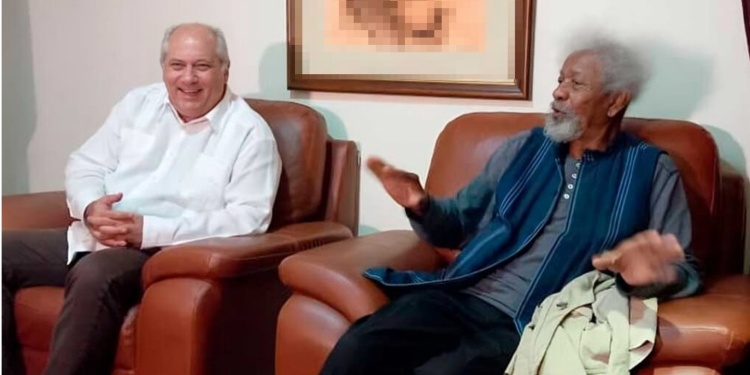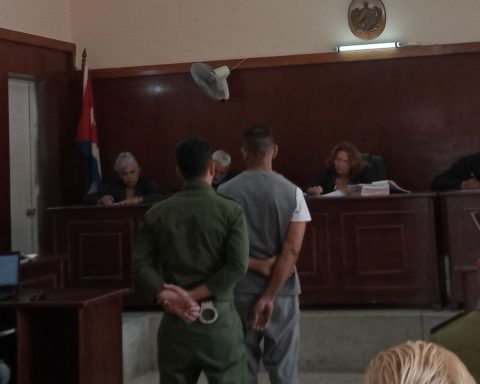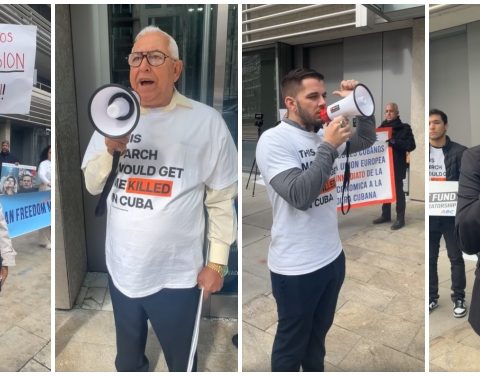SAN LUIS POTOSÍ, Mexico.- Nigerian writer Wole Soyinka, Nobel Prize winner in Literature, is in Cuba these days on the occasion of his participation in the commemoration of the 30th anniversary of the UNESCO programme on the Slave Route.
Alpidio Alonso Grau, Minister of Culture and repressor of the regime, received the writer at the José Martí International Airport and said that his visit was due to his attendance at the International Conference “New narratives: memory, resistance and vindication”, in honor of the 30th anniversary of the UNESCO program.
We are pleased to announce the arrival of the Nobel Prize winner for Literature, Wole Soyinka. It is an honour to have him back with us, for his work, permanent commitment and transcendent political activism in favour of just causes. #Cuba It is your home. We will be keeping abreast of this important Conference. https://t.co/3PLV4yKaz3
— Miguel Diaz-Canel Bermudez (@DiazCanelB) August 20, 2024
For his part, President Miguel Díaz-Canel joined in welcoming the Nigerian and wrote: “It is a great news that the Nobel Prize winner in Literature, Wole Soyinka, has arrived. It is an honour to have him among us again, for his work, permanent commitment and transcendent political activism in favour of just causes. Cuba is his home.”
Wole Soyinka, born Akinwande Oluwole Soyinka, was the first African to be awarded the Nobel Prize in Literature, an award conferred in 1986.
He is a playwright, poet, novelist, lecturer, critic, professor, actor, translator, politician and editor.
At the International Conference commemorating the 30th anniversary of UNESCO’s programme “The Routes of Slave People”, the historical amnesia regarding slavery is denounced and the need to continue fighting against racial discrimination and injustice is called for. pic.twitter.com/6UoK9xBHRN
— Alpidio Alonso Grau (@AlpidioAlonsoG) August 21, 2024
In Nigeria, Soyinka was Professor of Comparative Literature (1975 to 1999) at Obafemi Awolowo University, then called the University of Ifẹ̀.
In December 2017, he was awarded the Europa Theatre Prize in the “Special Prize” category, for having contributed “to the realization of cultural events that promote understanding and the exchange of knowledge between peoples.”
The Route of Enslaved People
The International Conference on the Slave Route, which runs until August 23, aims to “analyze and debate issues such as resistance, freedom and wealth converted into heritage brought by people from Africa through a triangular transatlantic slave trade” and is being held in a country with deep problems of racism.
According to Alpidio Alonso, this commemoration “denounces the historical amnesia about slavery and claims the need to continue fighting against it.” discrimination racial and injustice.”
At the end of June, the minister himself, in a debate on the “Cuban Color” project in Cienfuegos, described the manifestations of racism as “historical disadvantages” and acknowledged that these have been exacerbated by the economic crisis in the country.
“There is a historical disadvantage, because they are the ones who have suffered the most. The Revolution created conditions for everyone, but even today, especially now in a time of such deep economic difficulties as the one we are going through, these disadvantages come to light,” said Alonso.
Although Castro’s propaganda has attempted to cover up racial discrimination on the island since 1959, the gaps of inequality have remained present among Cubans for around 65 years.
Carlos Quesada, the executive director of the International Institute on Race, Equality and Human Rightssaid last year that there is structural racism and racial discrimination that is “quite worrying” in Cuba.
















